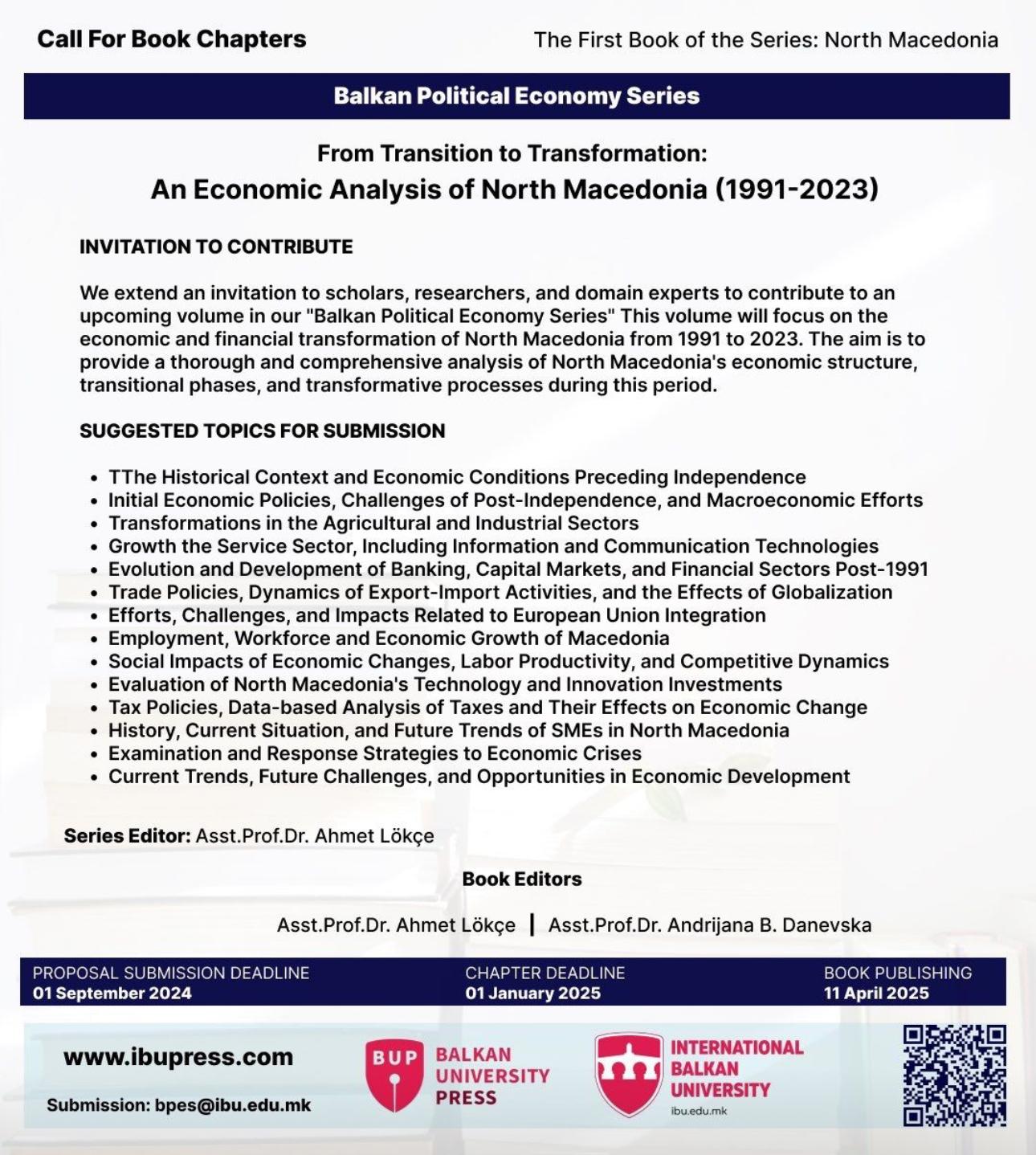Call for Book Chapters for the Balkan Political Economy Series

Balkan University Press
| Balkan Political Economy Series |
The First Book of the Series: North Macedonia
“From Transition to Transformation: An Economic Analysis of North Macedonia (1991-2023)”
Invitation to Contribute
We extend an invitation to scholars, researchers, and domain experts to contribute to an upcoming volume in our "Balkan Political Economy Series" This volume will focus on the economic and financial transformation of North Macedonia from 1991 to 2023. The aim is to provide a thorough and comprehensive analysis of North Macedonia's economic structure, transitional phases, and transformative processes during this period.
Suggested Topics for Submission
- The Historical Context and Economic Conditions Preceding Independence
- Initial Economic Policies, Challenges of Post-Independence, and Macroeconomic Efforts
- Transformations in the Agricultural and Industrial Sectors
- Growth of the Service Sector, Including Information and Communication Technologies
- Evolution and Development of Banking, Capital Markets, and Financial Sectors Post-1991
- Trade Policies, Dynamics of Export-Import Activities, and the Effects of Globalization
- Efforts, Challenges, and Impacts Related to European Union Integration
- Employment, Workforce and Economic Growth of North Macedonia
- Social Impacts of Economic Changes, Labor Productivity, and Competitive Dynamics
- Evaluation of North Macedonia's Technology and Innovation Investments
- Tax Policies, Data-based Analysis of Taxes and Their Effects on Economic Change
- History, Current Situation, and Future Trends of SMEs in North Macedonia
- Examination and Response Strategies to Economic Crises
- Current Trends, Future Challenges, and Opportunities in Economic Development
Series Editor: Asst. Prof. Dr. Ahmet Lökçe
The First Book Editors: Asst. Prof. Dr. Ahmet Lökçe | Asst. Prof. Dr. Andrijana B. Danevska
Proposal Submission Deadline: 01 September
Chapter Deadline: 01 January
Book Publishing: 11 April
Submissions: bpes@ibu.edu.mk | https://www.ibupress.com
Details of the Application for the Book Chapters
a) Detailed Suggested Topics for Submission
The Historical Context and Economic Conditions Preceding Independence:
Exploring the economic landscape and historical factors that shaped the economy of North Macedonia before achieving independence. This includes examining the colonial or imperial influences and the pre-independence economic structures.
Initial Economic Policies, Challenges of Post-Independence, and Macroeconomic Stabilization Efforts:
Analysis of the initial economic strategies adopted by the newly independent country. This topic will cover the economic challenges faced during the transition period, such as inflation, unemployment, and efforts to achieve macroeconomic stability.
Transformations in the Agricultural and Industrial Sectors:
Examination of the significant changes and developments in the agricultural and industrial sectors post-independence. This includes modernization efforts, productivity improvements, and the overall impact on the national economy.
Growth and Development within the Service Sector, Including Information and Communication Technologies (ICT):
Insights into the growth and evolution of the service sector in North Macedonia, with a particular focus on the development of Information and Communication Technologies and their impact on economic growth.
Evolution and Development of Banking, Capital Markets, and Financial Sectors Post-1991:
Assessment of the growth and transformation of the banking sector, capital market, and overall financial sector since 1991. This includes changes in interest rates, money supply, and the establishment of financial institutions.
Trade Policies, Dynamics of Export-Import Activities, and the Effects of Globalization:
Analysis of trade policies implemented by North Macedonia, the dynamics of its export and import activities, and the broader effects of globalization on Macedonian economy. This also includes the role of foreign direct investment (FDI) and tax incentives.
Efforts, Challenges, and Impacts Related to European Union Integration:
Reviewing the efforts of North Macedonia to integrate into the European Union, the challenges encountered during this process, and the economic and social impacts of EU integration on North Macedonia.
Employment, Workforce and Economic Growth of North Macedonia:
Data-based analysis of labor market evolution, including trends, challenges and policy responses in employment. This includes data – driven insights and strategies in workforce development, adopted policies and their relation to economic growth.
Social Impacts of Economic Changes, Labor Productivity, and Competitive Dynamics:
Investigating how economic transformations have affected social structures, labor productivity, and competitive dynamics within North Macedonia. This includes examining changes in welfare, inequality, technology adoption, and entrepreneurship.
Evaluation of North Macedonia’s Technology and Innovation Investments:
Data-based analysis of investments in technology and innovation, including national and international support for economic transformation. This includes the effects of national and international support funds on the country's change and their impact on social change.
Tax Policies, Data-based Analysis of Direct and Indirect Taxes and Their Effects on Economic Change:
Providing insights into tax policy reforms in North Macedonia, data-based examination on economic change through the lens of taxation and evaluating the effects of tax policies on economic growth and development. This includes North Macedonia’s tax policy reforms contributing to sustainable economic growth.
History, Current Situation, and Future Trends of SMEs in North Macedonia:
Analysis of the Evolution of SMEs in North Macedonia by reviewing its historical context, current landscape and challenges and opportunities for SMEs. This includes data-based analysis and forecast of economic changes in a transitional economy, future trends and strategic directions for SMEs.
Examination and Response Strategies to Economic Crises:
Studying the strategies employed by North Macedonia to respond to and recover from economic crises. This includes policy responses, crisis management approaches, and lessons learned from past economic downturns.
Current Trends, Future Challenges, and Opportunities in Economic Development:
Predicting future economic trends in North Macedonia, identifying potential challenges, and exploring opportunities for sustainable economic development and growth. This includes anticipating changes in the global economic environment and their potential impact on North Macedonia.
b) Submission Dates:
Abstract Proposal Deadline: 01 September 2024
Announcement of Accepted Proposal Submission: 20 September 2024
Chapter Deadline: 01 January 2025
Peer Review Report Sent to Authors: 01 February 2025
Final Chapter Submission by Authors: 01 March 2025
Book Publishing: 11 April 2025
Submissions: bpes@ibu.edu.mk | https://www.ibupress.com
c) General Framework
Chapter Proposal
- Length: 750-1000 words.
- Content: Provide a concise yet comprehensive overview of the chapter’s main arguments, methodologies, and findings.
Chapter Structure
- Length: Each chapter should consist of 6000-9000 words, including footnotes.
- Language: All chapters must be written in English.
Formatting
- Use Microsoft Word with a minimum of 2.5 cm margins on all sides.
- The entire text should be in Times New Roman font.
- Font Size: Main text should be size 12 with 1.5 line spacing.
- Chapter Title: Should be in capital letters, bold, size 14.
- Subtitles: Should be in lowercase, regular font, size 12.
Tables and Figures
- Sequential Numbering: All tables and figures should be numbered in sequential order.
- Footnotes for Tables: Should be placed directly below the table body and indicated in lowercase.
- Minimal Usage: Use tables sparingly and ensure they add value to the text.
- Data Representation: Avoid duplicating data presented in the tables and the text.
References
- References are cited at the end of the text using the APA 7th ed.citation style. The list of References shall only include works that are cited in the text.
- For direct or indirect citations in the text, the reference must be cited by the author’s last name and the year of publication, for example: (Baron, 2008), or, if there are more than one authors (Adams et al., 2010). If the citation is direct, it is necessary to cite the page as well, e.g. (Lawrence, 1966, p.124).
Peer Review and Publication
- Contributions will undergo peer review for quality and relevance.




